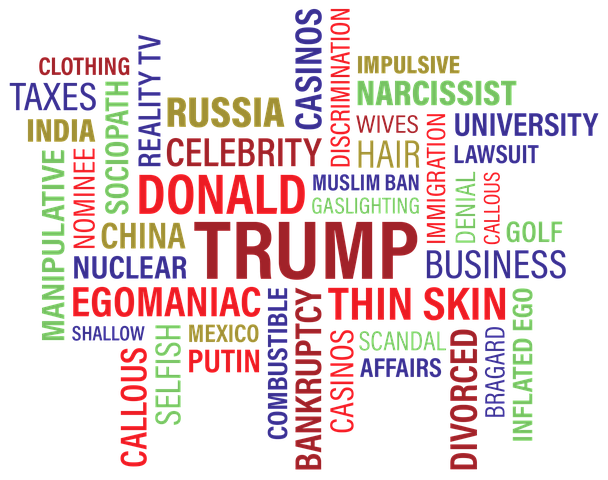My Year of Preaching with Donald Trump

Preaching during the first year of the Trump Presidency has been hell!
I’ve rewritten at least a dozen sermons on Saturday night, a rarity for me until this year, all because the President regularly tweets insults for his weekend entertainment. Frequently I’ve had to ask myself: Are these remarks really coming from the President of the United States of America? I’ve had to grapple with what his damaging words are doing to the American people, because I believe that when one person is diminished, we are all diminished.
Leading up to his election he insulted every opponent, including “Lying Ted” and “Little Marco.” He saved his most acerbic remarks for “Crooked Hillary.” It’s hard to decide if his obsession with Secretary Clinton is a sick form of victorious gloating or simply misogynistic abuse. Either way it is wrong. His reference to the leader of North Korea as “Rocket Man” cheapens the dignity of the United States. He recently left an ugly stain on a ceremony honoring Native American WW II veterans by hurling racist remarks toward Senator Elizabeth Warren.
As a clergyperson, I do my best to inspire people to honor their highest angels, imploring people to treat others with dignity, respect and compassion. Respect for the “other” isn’t merely a religious value for a few; it is a foundational attribute of our American democracy. I’m not sure how President Trump expects to make America great again, if all he does is diminish Americans, including American Muslims, American women, Native Americans, African Americans, American newspaper and television reporters, and American children who are facing a crisis in health care.
As a theologian and minister, how can I not address these weekly rants by the President in my sermons? How can I not stand up and denounce xenophobia? His bullying discourse and reprehensible behavior? How can I not stand up for justice and compassion for the broken, the marginalized, and the forgotten people of this world? How can I not remind people that an “eye for an eye” is attitude that will leave all of us blind, and that a nation only thrives when all its citizens are thriving?
Some in my congregation believe I have become too political. They may be right. I know some of them voted for President Trump, and I’m always careful not to offend their right to vote their conscience. But I have a conscience too. Moreover, like so many of my colleagues around the country, I have a calling I’m trying to honor. I have preached against what I perceive as bigotry and racism and bullying and misogyny, and any other kind of discourse that tears down rather than builds up. When the President explained, after the terrible violence at a neo-Nazi rally in Charlottesville, that there were “good people on both sides,” I was completely and utterly aghast. How can I not speak up?
The President’s words are troubling enough, but his policies are also disconcerting. I believe that the great moral issue of our time is climate change. Yet, the President has pulled away from the Paris Climate Agreement, and in so doing has compromised America’s moral leadership on this important issue. Furthermore, he continues to push coal as a viable source for our future, his Environmental Protection Agency has become a lackey to energy corporations, and he recently released thousands of acres of protected wilderness in Utah, opening the door for more environmental exploitation.
Is it too political to raise this issue in a Sunday sermon? But what if I believe that, “The earth is the Lord’s, and the fullness thereof?” What if I believe that God’s presence is incarnate in our mountains and oceans and deserts? What if believe that the earth is the “body of God,” and how we treat the earth is how we treat God and how we treat God is always measured in how we treat the earth? If this is too political for a church service, I’m sorry, but there is a relationship between political policy and the ideals of faith.
Many times this past year, often near midnight on Saturday, I have said to myself: “It’s not that big of deal. Preach a nice sermon and forget about it.” Yet, I keep thinking that twenty years from now, someone will look back on the Trump Presidency and ask: “Why didn’t any clergy speak up?” Well, some of us do speak up, and we do so with humility, passion, and respect, loving our country enough to call us back to our senses. Yes, a few of us do speak up, even when some in our churches want us to remain silent.
About the Author
Scott Colglazier is Senior Minister of First Congregational Church of Los Angeles, the oldest Protestant Church in the city, and is author of the online blog “Take a Breath.”
